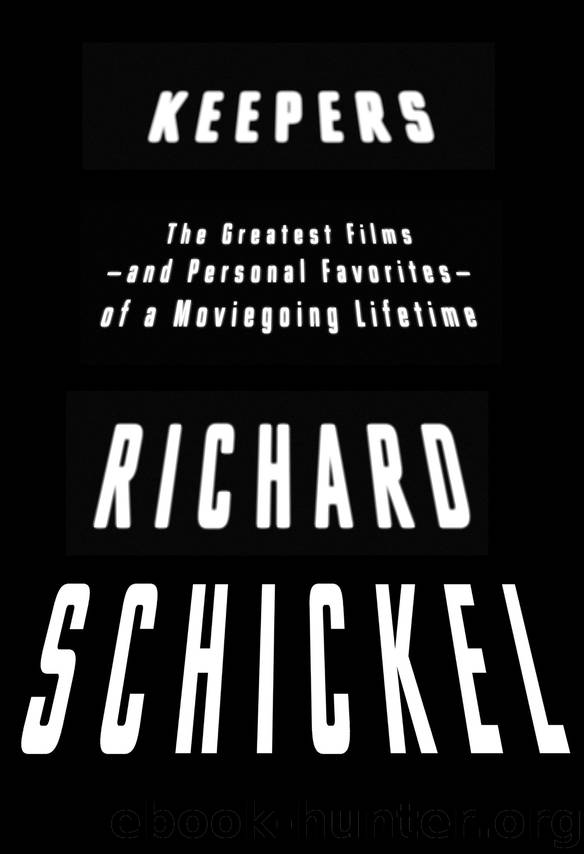Keepers: The Greatest Films -- And Personal Favorites -- of a Moviegoing Lifetime by Richard Schickel

Author:Richard Schickel [Schickel, Richard]
Language: eng
Format: epub
ISBN: 9780375424595
Amazon: 0375424598
Publisher: Knopf
Published: 2015-06-22T22:00:00+00:00
21
Why We Fight
Britain had a history dating back to before the Magna Carta—a sustaining tradition. Other Allied nations had something similar to see them through the war years, to buck them up when the going got tough. But American history was comparatively short. We had suffered the Civil War, but that experience somehow did not seem entirely relevant to the present crisis. We had recently endured the Great Depression, but the harsh lessons learned from it did not seem particularly applicable to the war years, either. It was all well and good to bleat on about democracy and the glories of the American way of life, but there wasn’t much fun to be found in speechifying. We needed something more cheerful, more innocent and sentimental, to keep us up and hopeful as the war wore on. We found that chiefly in nostalgia. During the war years, and for a while after them, movie after movie took us, among other places, back in time to the “Gay” Nineties and its songs—some authentic to the period, others pastiches of their manner.
Twentieth Century Fox had the best routine lot in this line of business. Betty Grable, famous for her legs and a pert presence on the screen, was from 1942 to 1951 absent only once from the annual list of the top box office stars. She could sing a little and dance a little and be sexy a little in a distinctly nonthreatening way. She seemed to be a nice girl; she was rather good in Mother Wore Tights—a showbiz life recalled—and persuasively scared in I Wake Up Screaming. Best of all, she was parentally approved, which could not necessarily be said of more dangerous-seeming rivals like Rita Hayworth. Fox had some nonthreatening guys like Don Ameche on their payroll, too. (It was quite late in his career before he proved that he could actually act.) The truth of the matter is that the studio’s standard was routinely good-natured and genial—their musicals and comedies were okay, but rarely challenging. I think that was all right with the wartime audience. They were not looking for trouble. A bland biopic about a pair of songwriters, say, was just fine.
It was not until Darryl Zanuck came back from the war and started making more hard-hitting movies that the studio came into its own for a few years. He made tough movies—twists on his old Warner Bros. style. Kiss of Death (1947) is a good example, and Richard Widmark madly giggling his way to glory was, for a time, something new and definitely strange to the movies. He would not have been more than a character man before the outbreak of hostilities. When many of the major male stars were in the armed services, many of the older guys and the 4-Fs took up the slack, with, it seems, no notable diminishment in the movies’ quality.
One Saturday night in 1942, there was an uncommon stir at 1721 North Sixty-eighth Street. We were going to the movies as a family.
Download
This site does not store any files on its server. We only index and link to content provided by other sites. Please contact the content providers to delete copyright contents if any and email us, we'll remove relevant links or contents immediately.
The Kite Runner by Khaled Hosseini(5171)
Gerald's Game by Stephen King(4644)
Dialogue by Robert McKee(4392)
The Perils of Being Moderately Famous by Soha Ali Khan(4218)
The 101 Dalmatians by Dodie Smith(3506)
Story: Substance, Structure, Style and the Principles of Screenwriting by Robert McKee(3463)
The Pixar Touch by David A. Price(3432)
Confessions of a Video Vixen by Karrine Steffans(3303)
How Music Works by David Byrne(3263)
Harry Potter 4 - Harry Potter and The Goblet of Fire by J.K.Rowling(3064)
Fantastic Beasts: The Crimes of Grindelwald by J. K. Rowling(3055)
Slugfest by Reed Tucker(2999)
The Mental Game of Writing: How to Overcome Obstacles, Stay Creative and Productive, and Free Your Mind for Success by James Scott Bell(2907)
4 - Harry Potter and the Goblet of Fire by J.K. Rowling(2700)
Screenplay: The Foundations of Screenwriting by Syd Field(2638)
The Complete H. P. Lovecraft Reader by H.P. Lovecraft(2558)
Scandals of Classic Hollywood: Sex, Deviance, and Drama from the Golden Age of American Cinema by Anne Helen Petersen(2520)
Wildflower by Drew Barrymore(2486)
Robin by Dave Itzkoff(2438)
